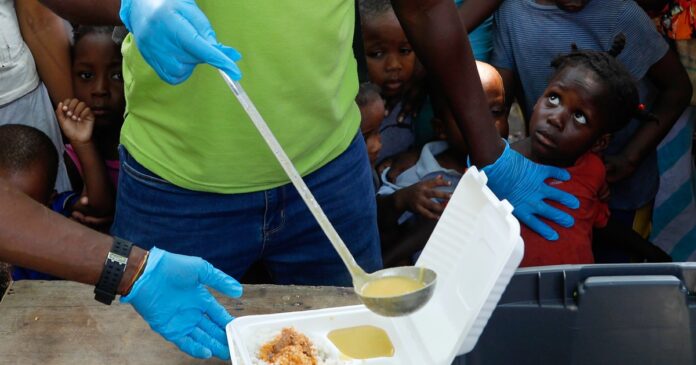Monique Clesca lives in a suburban area in the mountains just above Port-au-Prince, away from the center of violence in the flatlands below. But Clesca said she fears the armed groups that control much of the capital city of Haiti will make good on their promise to go up into the hills and wreak havoc.
Clesca said she is largely confined to her home.
“A lot of stores have been closed. I went to the supermarket last Saturday, half an hour, just in and out. I rushed out,” she told NBC News. She said farmers and fishermen based in the rural areas outside the capital have not been able to bring their goods to Port-au-Prince for weeks. “There is a lot of poverty,” she said.
Haitian residents facing poverty and even starvation are desperate for food, shelter and medical supplies as political tensions grow and violence continues to escalate. Much aid is needed, but advocates and residents say the best humanitarian aid is one that supports the work of grassroots groups already established and helping civilians every day. Foreign aid, they say, usually falls into the hands of armed groups.
Haiti’s decadeslong political crisis and dire humanitarian emergency have come to a head since its de facto leader said he would resign. Amid the uncertainty, residents live in fear of armed groups who control everything, from where people can go safely to what resources they can access. But people have been trying to flee Port-au-Prince, the epicenter of the violence, for well over a year, and about 160,000 people have been displaced in the last several months, according to the U.N. Violent armed groups have occupied the Autorité Portuaire Nationale, the country’s largest port, obstructing access to most humanitarian aid.
In response, the European Commission has allocated 20 million euros to Haiti; the Biden administration has committed $33 million, and the United Nations announced on Thursday that it would establish an air bridge between Haiti and the Dominican Republic to make sure resources get into the country. The border between the two countries is closed now.
Greg Beckett, an associate professor of anthropology at Western University in Canada, told NBC News that while it seems foreign nations are allocating a lot of aid, that does not always mean it will reach the people who need it.
“There’s always these pledges of money, whether the money gets dispersed or not is one thing. It’s gonna go to the government, and you have a completely unconstitutional government in Haiti that’s not accountable and it’s not really clear how it’s spending any of that money,” Beckett, who has spent years intermittently working in Haiti, told NBC News.
When the gangs took over, they attacked the Autorité Portuaire Nationale and ransacked the shipping containers that were stored there, Beckett explained. “The food coming in can always be seized in some way,” he said.
Still, there are groups on the ground, many of them run by Haitians who are familiar with the complexities of the country, already operational. Fokal, Fonkoze and Partners in Health, an international nonprofit with several hospitals that employ almost all-Haitian teams, have worked consistently with those in and outside of Port-au-Prince amid the recent crisis.
Louino “Robi” Robillard, a Haitian community development activist, is the program director for Rasin Devlopman and co-founder of Gwoup Konbit, both of them organizations that advocate for resource-sharing, solidarity, and sustainable, Haitian-led development.
“We work with people in the countryside to empower them to use their local resources. Farm the land, plant more foods, look for resources that they have in their own communities,” Robillard said.
“People have to see development in a holistic way. We want people to not see Haitians as a group that are suffering with nothing to contribute. Haitians are very strong and we’ve been dealing with a lot but we’re still a very strong population. If we still can stand, it’s because people are together,” Robillard added.


